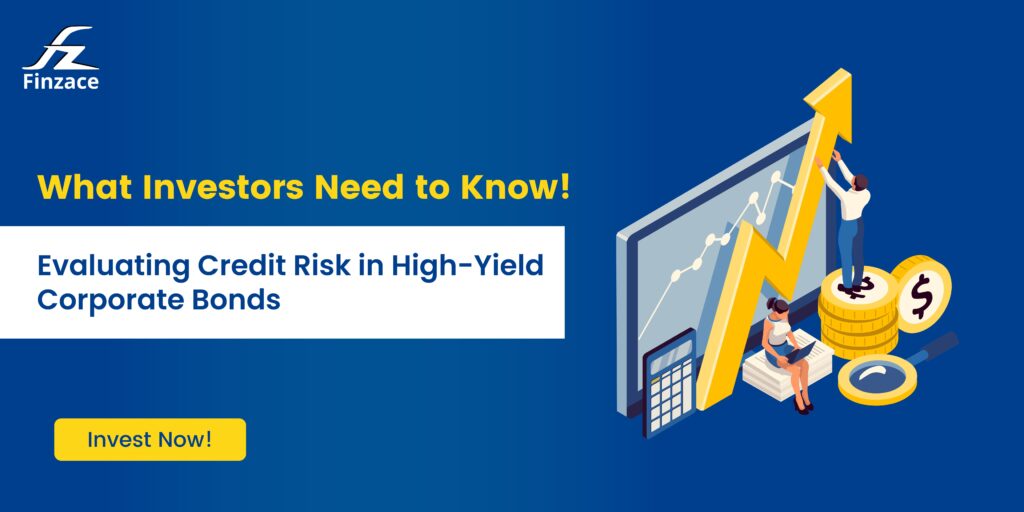Evaluating Credit Risk in High-Yield Corporate Bonds: What Investors Need to Know

For investors looking for larger returns than standard fixed-income instruments, high-yield corporate bonds might be an alluring option. These bonds, sometimes called “junk bonds,” do, however, carry a higher credit risk. Making wise investing decisions requires an understanding of and assessment of this risk. We’ll go over the main elements that investors should take into account when evaluating the credit risk of high-yield corporate bonds in this article.
Understanding Credit Risk
Credit risk is the possibility that a bond issuer won’t fulfill its commitments and won’t pay back the principal or interest. Because of the issuer’s lower credit rating, high-yield corporate bonds are more credit risky than investment-grade bonds. These bonds have a higher default likelihood since Standard & Poor’s and Moody’s ratings are below BBB- and below Baa3, respectively.
Key Factors in Evaluating Credit Risk
1. Credit Ratings
Credit ratings offer a brief overview of the issuer’s creditworthiness and are provided by rating organizations like Moody’s, Standard & Poor’s, and Fitch. Based on a careful examination of the issuer’s financial situation, including its capacity to repay debt, these ratings have been determined. Even though a high-yield bond will always have a lower rating, it’s important to compare ratings from various issuers and comprehend the factors that influence them.
2. Issuer’s Financial Health
Examining the financial statements of the issuer is essential. Important metrics to assess consist of:
– Debt-to-Equity Ratio: This ratio shows the percentage of debt to equity held by shareholders. A high percentage indicates that the business is mostly dependent on debt funding, which might be dangerous if earnings aren’t high enough to pay interest.
– Interest Coverage Ratio: This ratio assesses how well the business uses operating earnings to cover interest payments. Higher danger is indicated by a lower ratio.
– Cash Flow: A company’s capacity to pay down debt is well-represented by a positive and steady cash flow from activities.
3. Industry and Economic Conditions
The credit risk profile of the issuer is heavily influenced by its industry as well as the overall state of the economy. Risks are higher in industries that are cyclical or that are experiencing economic challenges. On the other hand, businesses in expanding or stable sectors are typically safer investments. Macroeconomic variables including interest rates, inflation, and overall economic growth should also be taken into account by investors.
4. Management and Corporate Governance
Credit risk can be reduced by competent management and good corporate governance procedures. Investors should consider the leadership team’s track record, their strategic vision, and their capacity for successful plan execution. Positive indications also include clear communication strategies with investors and transparent governance processes.
5. Bond Covenants
In order to safeguard bondholders, the bond agreement contains provisions known as bond covenants that place limitations on the issuer. These could include limits on taking on new debt, holding onto specific financial ratios, or limiting the selling of assets. Robust covenants can confer extra protection to investors by restricting the issuer’s capacity to undertake measures that could compromise its fiscal soundness.
Diversification and Risk Management
There are dangers associated with investing in high-yield corporate bonds, even with careful credit risk assessment. One of the most important tactics for reducing these hazards is diversity. Investors can lessen the effect of a single issuer’s default on their whole portfolio by distributing their investments among a variety of issuers, industries, and geographical areas.
Utilizing Professional Insights
Professional insights may be beneficial for private investors due to the intricacy of credit risk evaluation. High-yield bond experts and fund managers have the knowledge and resources to carry out in-depth research, find appealing investment possibilities, and successfully manage risk.
Conclusion
Although high-yield corporate bonds have a higher credit risk, they have the potential to deliver significant rewards. Investors can make better selections if they have a thorough understanding of the major components that go into evaluating credit risk, including credit ratings, financial health, industry circumstances, management caliber, and bond covenants. A high-yield bond portfolio’s risk-return profile can be further improved by using diversification and consulting a professional. Investors can minimize the risks and maximize the returns from high-yield corporate bonds by carefully assessing and managing them.
High-yield corporate bonds appeal to investors due to their potential for higher returns compared to safer investments like government bonds or investment-grade corporate bonds. This appeal is particularly strong in low-interest-rate environments where investors are searching for income-generating assets. However, investors must balance these benefits against the risks of higher default rates and market volatility.
For those willing to accept these risks and conduct thorough due diligence, high-yield bonds can be a valuable addition to a diversified investment portfolio. They offer the opportunity for enhanced returns and can serve as a strategic hedge against broader market movements. As with any investment decision, careful assessment of individual risk tolerance and financial goals should guide the inclusion of high-yield corporate bonds in an investment strategy.
Discover the best fixed-return investments in India with Finzace, your trusted partner in achieving financial growth. At Finzace, we offer a variety of high-return fixed-income investments designed to meet the needs of investors seeking reliable returns. Our low-risk investment options in India provide a safe avenue for growing your wealth without undue risk.
For those looking for the best safe investments with high returns, Finzace is your go-to solution. Our secured investment options ensure your capital is protected while still delivering competitive returns. Whether you’re interested in short-term gains or long-term security, we provide the best short-term fixed-income investments that fit your financial goals.
Investing in NCDs (Non-Convertible Debentures) through Finzace allows you to tap into a stable market. Additionally, our high-yield corporate bonds offer an excellent opportunity for those seeking higher returns without compromising on security.
Choose Finzace for all your investment needs and benefit from our expertise in managing high-yield bonds and secured investments. With Finzace, you can confidently navigate the investment landscape and secure a prosperous financial future.
